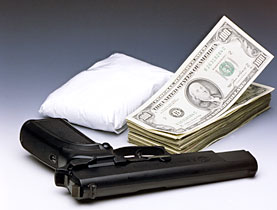Mafia smuggling case comes to court

The largest case of organised crime ever heard before a Swiss court opens in Bellinzona this week.
The trial of nine alleged members of an international cigarette smuggling ring, all of them Swiss residents, begins on Wednesday. They are accused of supporting Italian criminal organisations and money laundering.
According to the Federal Prosecutor’s Office, the accused were part of a criminal enterprise involved in the smuggling of cigarettes between Montenegro and Italy. They are said to have laundered more than $1 billion (SFr1.15 billion) from the illegal trade in Switzerland.
In the dock are four Swiss, three Italians, one Spaniard and one Frenchman, living in the Italian-speaking canton of Ticino and the French-speaking cantons of Jura and Vaud.
The prosecution claims that between 1994 and 2001, money from two criminal organisations based in southern Italy, the Camorra of Naples and the Sacra Corona Unita of Apulia, was channelled into the Swiss banking system via money exchange businesses in Ticino. It is alleged that practically all the money was brought over the border in cash by couriers.
“Grey” market
The money was then invested in the purchase of cigarettes on the international “grey” cigarette market. They were bought from duty-free, bonded warehouses in Rotterdam or Antwerp or from wholesalers and taken illegally to Montenegro, avoiding any payment of duty.
The indictment says that well-known freight companies based in Switzerland were among those used to transport them, including Danzas, Mundotrans or Swissair Cargo.
The mafia then used speedboats to transfer the cigarettes across the Adriatic from Montenegro to the Apulian coast and from there to the black markets in Naples and Apulia, where they were sold for a profit.
A total of 4.3 million crates – some 215 million cartons – are thought to have been smuggled to Italy, but the indictment says that some were also sold on the black markets in Spain and Britain.
Montenegro connection
Montenegro, which at that time was politically isolated, also did well out of the business, lawyers argue, since the country awarded import licences and demanded transit fees.
The accused were in possession of these licences or sublicences. If the fees were not paid, the local Montenegrin authorities prevented the smugglers’ boats from leaving.
High-ranking politicians are said to have been involved in the activities.
The accused include Franco Della Torre, 66, regarded as the ringleader, and Alfredo “Fredy” Bossert, 73, the owner of a currency-exchange business in Lugano.
Mafia financing
Bossert alone is said to have received and laundered the equivalent of $795 million.
“In particular by setting up and running the logistics of the finances he helped the criminal organisations to make large profits and thereby contributed to the long-term strengthening of their power,” says the indictment. The other accused face similar charges.
All of the defendants have to answer charges of involvement in a criminal organisation and money laundering.
In concerted raids all over the country on August 31, 2004, the Federal Prosecutor’s Office struck a serious blow against the cigarette mafia and arrested a number of people.
The accused in the present trial were released conditionally or on bail after being detained for questioning for 100 days.
swissinfo, based on an article in German by Gerhard Lob in Bellinzona
Because of the size of the trial, it will not be held in the premises of the federal criminal court but in the chamber of the Ticino cantonal government.
Three prosecutors are taking part on behalf of the Federal Prosecutor’s Office.
The results of the investigation take up 1,000 files. Anti-mafia investigators also supplied additional information.
Two days will be spent on the opening of the trial, which will then reconvene on May 4. It will continue, with interruptions until June 19.
The date when the court will announce its findings is still open.
The trial will be held in German, although none of the accused is a German speaker. Both the accused and the Ticino lawyers’ union have protested against this decision.
The publication of the indictment has also been the cause of dispute. Accredited journalists received only the cover sheet and the last 30 pages of the total of 233.

In compliance with the JTI standards
More: SWI swissinfo.ch certified by the Journalism Trust Initiative











You can find an overview of ongoing debates with our journalists here . Please join us!
If you want to start a conversation about a topic raised in this article or want to report factual errors, email us at english@swissinfo.ch.